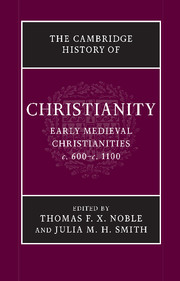Book contents
- Frontmatter
- Introduction: Christendom, c. 600
- Part I Foundations: Peoples, Places, and Traditions
- Part II Christianity in Confrontation
- 7 Christians and Jews
- 8 The Mediterranean Frontier: Christianity face to face with Islam, 600–1050
- 9 Christians under Muslim rule
- 10 Latin and Greek Christians
- 11 The northern frontier: Christianity face to face with paganism
- Part III Christianity in the Social and Political Order
- Part IV Christianity as Lived Experience
- Part V Christianity: Books and Ideas
- Conclusion: Christendom, c. 1100
- Bibliographies
- Index
- References
8 - The Mediterranean Frontier: Christianity face to face with Islam, 600–1050
from Part II - Christianity in Confrontation
Published online by Cambridge University Press: 28 March 2010
- Frontmatter
- Introduction: Christendom, c. 600
- Part I Foundations: Peoples, Places, and Traditions
- Part II Christianity in Confrontation
- 7 Christians and Jews
- 8 The Mediterranean Frontier: Christianity face to face with Islam, 600–1050
- 9 Christians under Muslim rule
- 10 Latin and Greek Christians
- 11 The northern frontier: Christianity face to face with paganism
- Part III Christianity in the Social and Political Order
- Part IV Christianity as Lived Experience
- Part V Christianity: Books and Ideas
- Conclusion: Christendom, c. 1100
- Bibliographies
- Index
- References
Summary
Islam came face to face with Christianity from its beginnings. Christians and Jews were regarded as “People of the Book” because they had a revealed monotheistic religion. Even though they had corrupted this religion and turned away from the true path, they deserved a measure of respect and tolerance, unlike pagans with whom no coexistence was possible. Nevertheless, the new religion developed an ideology of confrontation with non-Muslims which almost inevitably led to conflict. The idea of holy war or jihād is developed in a number of suras of the Qur’ān but, as often in the Qur’ān, the message is not a simple and unequivocal one. The sacred text presents apparently conflicting advice to the faithful as to how they should confront the enemies of the new religion. There are a significant number of passages which advise nonviolent argument and preaching when dealing with the “People of the Book.” In contrast there are other passages in which the Muslims are exhorted to go and fight in the path of God, and those who do not are castigated for failing in their religious duties. These culminate in 9.5:
When the sacred months are past, kill the idolators wherever you find them and seize them, besiege them and lie in wait for them in every place of ambush: but if they repent, pray regularly and give the alms tax, then let them go their way, for God is forgiving, merciful.
Traditionally, Muslim scholars have reconciled the apparent contradiction by arguing that the quasi-pacifist exhortations are early revelation, from the time when the Muslims were few and they had to avoid confrontation to survive, while the more militant passages date from later when the Muslims were in a more powerful position and could challenge their enemies openly.
- Type
- Chapter
- Information
- The Cambridge History of Christianity , pp. 178 - 196Publisher: Cambridge University PressPrint publication year: 2008

